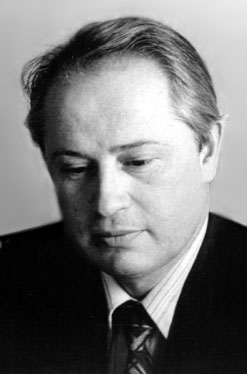(22.07.1936 - 26.07.1987)

V.G. Sprindzuk was a famous authority on the theory of Diophantine equations, Diophantine approximation and transcendental Number Theory. An alumnus of the Belorussian State University (1954-1959, where he was an undergraduate) and of the State University of Vilnius (1959-1962, where he undertook his postgraduate studies), he obtained his PhD in 1963, and his DSc degree in 1965. In 1969 he was made a full professor and a member of the Editorial Board of the Vesti of the Akademija Nauk BSSR (Mathematics). The following year he joined the Editorial Board of Acta Arithmetica, and in 1986 Prof. Sprindzuk became an Academician of the Belorussian Academy of Sciences.
While a pupil of the 8-th form, Volodya Sprindzuk read "Three pearls of Number Theory" by A.Ya. Khintchin and "Basic Number Theory" by I.M. Vinogradov and decided to become a professional mathematician. As a first year undergraduate student, V. Sprindzuk solved a problem posed by A.Ya. Khintchin, published it as his first paper, and wrote to the author of the problem. The four/five letters from Professor Khintchin were a source of great delight and inspiration for the young man. V. Sprindzuk read his first paper at a conference in Vilnius. The rector of the University of Vilnius Professor J. Kubilius attended his lecture and appreciated his result, later Prof. J. Kubilius became a scientific advisor of G. Sprindzuk. Both Professor Kubilius and Professor Yu.V. Linnik greatly influenced the studies of young Sprindzuk. In particular, Yu.V. Linnik directed Sprindzuk's efforts towards the theory of Diophantine approximation and transcendental number theory, an area of mathematics which lay outside his own interests. Linnik's judgement about the young mathematical talent proved to be right. During his postgraduate studies V. Sprindzuk became interested in the metric theory of transcendental numbers his PhD thesis was entitled "Metric theorems on Diophantine approximations by algebraic number of bounded degree". A year later V. Sprindzuk proved the Mahler conjecture in the theory of transcendental numbers. In the course of this work he developed a new method, nowadays called the method of essential and non-essential regions. In 1965 V.G. Sprindzuk defended his DSc dissertation "The Mahler problem in the metric theory of numbers" at the Leningrad State University. His dissertation and the papers of W. Schmidt of 1964 may be regarded as groundwork for a new area of research, the metric theory of Diophantine approximation of dependent variables. Sprindzuk's further studies in this direction are widely known.
In 1969, V. Sprindzuk was elected a corresponding member of the Belorussian Academy of Sciences, became a professor and the head of the department of number theory at the Mathematical Institute of the Belorussian Academy of Sciences. He started lecturing at the University of Minsk.
In the late sixties V. Sprindzuk began studying the theory of transcendental numbers and Diophantine equations. In 1969-71 he investigated the arithmetic properties of the Siegel hypergeometric E- functions with algebraic parameters and defined a wider class of E*-functions. His detailed studies of the Thue equation in algebraic number fields proved to be useful for the effective solution of a wide class of Diophantine equations and allowed him to study the possibility of effective approximations to algebraic numbers both in archimedean and non-archimedean domains. Sprindzuk's results are based on the connections between linear forms of logarithms in different norms. He observed that if a linear form is p-adically "not too small" then it cannot be too small in any other norm, be it archimedean or non-archimedean. A quantitative variant of this criterion led Sprindzuk to several effective results concerning the representation of numbers by binary forms, estimates for the magnitude of maximal prime factor of a binary form and the rational approximations to algebraic integers. He discovered in particular, a relation between the magnitude of the solutions of Diophantine equations and the number of classes of ideals, as well as some constructions of algebraic fields with the large class number.
These and other results of his are widely known. Professor Sprindzuk was an invited speaker at the ICM-1970 in Nice; he lectured at numerous international conferences in 1973, delivered lectures as a guest of Polish Academy of Sciences; in 1975 and 1977 he was a visiting professor of the Slovakian Academy of Sciences, in 1980 he visited the University of Paris.
In late seventies V. Sprindzuk began developing a theory of arithmetical specializations in polynomials and in the algebraic number fields. He investigated the relations between the coefficients in the power series representations of algebraic functions and the approximation properties of their special values. His theory allowed a universal Hilbert set to be made effective.
Professor Sprindzuk was the author of 84 papers, two thirds of which are translated into English and published in international editions. He wrote three monographs: Mahler's problem in metric number theory, Minsk, 1967 (AMS translation, 1969); Metric theory of Diophantine approximations, Moscow, 1977 (translation: Washington D.C, 1979); Classical Diophantine Equations, Moscow, 1982 (translation: Springer Lecture notes in Mathematics, 1559 (1993), Springer-Verlag).
Sprindzuk's methods and ideas proved to be an inspiration to many mathematicians. He devoted a lot of time and effort to the education of young mathematicians. He worked as chairman at the mathematical olympiads of the Republic of Belarus and lectured at the University of Minsk. Twelve of his pupils obtained PhD, and one of them is a Doctor of Science. In 1986 V.G. Sprindzuk became a member of the Belorussian Academy of Sciences.
Professor Sprindzuk died on 26 July 1987. He will be remembered by mathematicians for his work, by his students for his inspiring teaching and by the Institute of Mathematics for his Laboratory of Number Theory.
Publications of Vladimir Gennadievich Sprindzuk
Back to some biographies of past contributors to number theory